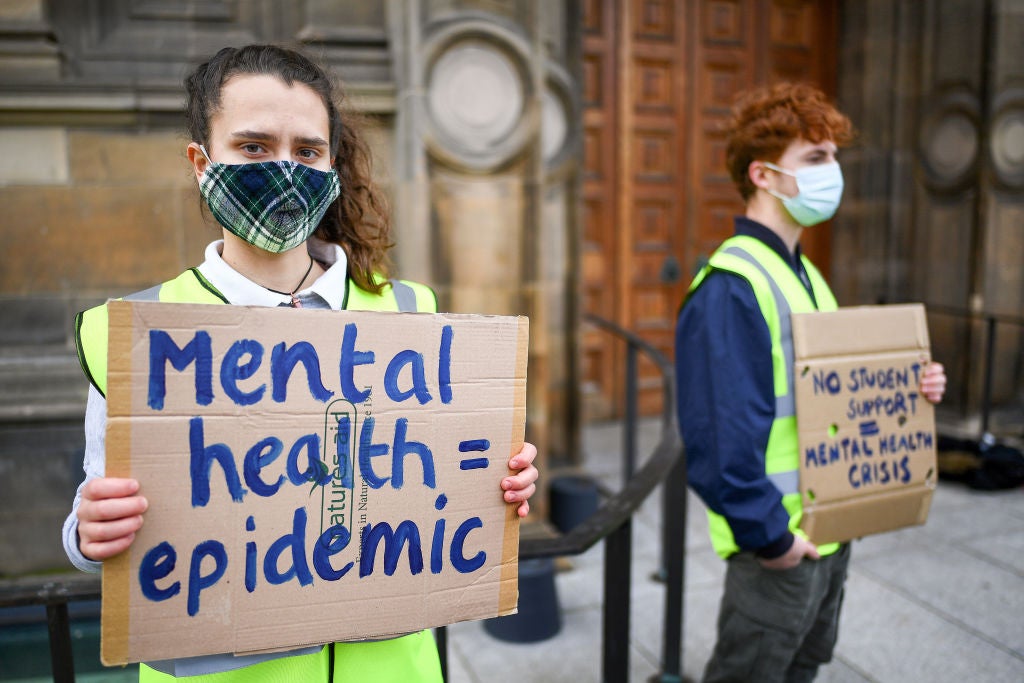I started university on antidepressants – this is my advice to any students who are struggling
I cannot begin to imagine how difficult the fresher experience could be this year, especially for those struggling with their mental health, but there is nothing to be ashamed of in asking for help


When I arrived at university in 2016, I had already been on a form of medication for my anxiety for about a year. The doctor I’d been referred to from school decided that, instead of giving me antidepressants, it would be better for me to take atenolol, a heart medication used to treat anxiety by reducing the release of adrenaline.
However, after a year on this medication, I knew something had to change. It was making me incredibly lethargic and dizzy, and while it helped manage my anxiety, the monster of depression I had been carrying around for years was still weighing heavily on my shoulders. I found myself too weak to fully embrace the freshers’ lifestyle and became increasingly withdrawn. Knowing I would not be able to cope without some form of change I made the decision to switch from atenolol to sertraline (an antidepressant commonly used to treat anxiety and depression) over the Christmas break.
This year, during a global pandemic, I cannot begin to imagine how difficult the fresher experience could be, especially for those struggling with their mental health. Coronavirus outbreaks at universities have led to some students isolating in their halls, unable to visit family or friends. Some students have gone weeks without physical contact with others. Unfortunately, these circumstances have also revealed the lack of support many universities offer in terms of pastoral care.
The Public Health Agency recently reported that “the full impact on students’ mental health as a result of the Covid-19 pandemic has yet to be assessed”. While the long-term effects of the pandemic on mental ill health is yet to be discovered, there is evidence to show that the number of people suffering has, unsurprisingly, already increased. The Mental Health Foundation states: “Young adults were more likely to report stress arising from the pandemic than the population as a whole. Findings from the third week of June show that 18-24 year-olds were still more likely than any other age group to report hopelessness, loneliness, not coping well and suicidal thoughts/feelings.”
It continued: “The proportion of young people aged 18-24 reporting suicidal thoughts or feelings, at 22 per cent, was more than double that of the population as a whole, at 10 per cent.”
Even before coronavirus, studies showed that mental ill health among students has increased in recent years, with more individuals reporting to have suffered while at university. In March 2020, the government released a report, which “found that 21.5 per cent [of students] had a current mental health diagnosis and 33.9 per cent had experienced a serious psychological issue for which they felt they needed professional help”.
After I made the decision to start on antidepressants four years ago, I was warned by my doctor that such medications often accentuated feelings of low mood and anxiety in the first month or so. On my return to university I did suffer more from these symptoms but found the additional burden more manageable than I had expected.
Where I really suffered was the lack of an established support network at university. Friendships I had made were still in their early stages and it was hard to open up and discuss how I was feeling when I wasn’t sure how my flatmates would react. While significant work has been done to tackle the stigma around mental health, I was still unsure how my new friends would feel about the fact I needed medication to get me through the day. I also felt that I could not reach out to my friends from home who were all either enjoying their own freshers’ year or the adventures of a gap year. Sharing my experiences with taking antidepressants seemed like a burden they would not want to bear.
The side effects of the new medication were also unpleasant. I suffered from nausea and gastrointestinal issues and also found myself needing to nap at least once a day. This, alongside a switch in my university course and the freshers’ lifestyle, was tough. Getting an appointment with the university surgery was a battle in itself and the individuals there made my visits feel more of a burden than a relief.
Now, after four years of taking medication, I realise that struggle was part of one of the best decisions I ever made for myself. While I still have periods where I wrestle with destructive thoughts, I am able to remember that most days I feel I can manage it and lead a happy life.
It feels scary to tell my story, especially when I still have not shared this part of my life with some of my closest friends. However, I feel it is important I do. I want to be able to help others going through similar experiences and show them that, as cliché as it sounds, there is a light at the end of the tunnel. Sadly, many individuals are still reluctant to take medication for their mental health, as society has often indicated it to be a sign of failure. In fact, taking such a decision for yourself is a sign of strength. There is nothing to be ashamed of in needing a bit of extra help.
If you are a student who is suffering, I would highly recommend reaching out to others, even if it’s just one person. While the idea of sharing how you’re feeling may seem terrifying, it can be helpful to talk it through. It is easy when you’re at your lowest to feel like no one else will understand how you’re feeling. But I can guarantee that there are people who are also suffering in silence. On your really bad days, it can be helpful to have someone checking up on you or being understanding when you explain you “really don’t want to go out tonight”.
If you’re not ready to reach out to friends or family, there are some great resources anyone can access. Mind UK is currently developing an amazing online service called Side by Side. Once up and running, anyone will be able to access the online community where you can receive help yourself and give support to anyone suffering from mental ill health. You may also wish to visit a counsellor. Getting appointments can take a while but I would advise booking something if you can so that you’ve got something to aim for. Some services are also offered over the phone if you feel this would be a better option for you.
Finally, if you decide you do want to take steps towards medication, book a doctor’s appointment. Sadly, the system does not make this easy and it can feel like a fight to be heard. Remember that you deserve the help. It can be tempting to play down your mental ill health to avoid feeling vulnerable or embarrassed, but it is important to be completely honest, so that you can receive the best help possible. You may find taking such steps exhausting, so do make sure that you allow yourself time to recover. After each appointment, plan something to reward yourself, whether it be a coffee with a friend or curling up in a blanket and watching your favourite show.
It can be hard to support your friends and family members when they start on medication, especially if you have no personal experience with mental ill health yourself. The best advice I can give is to show them you support and love them. While you may not always succeed in this, listen to how they’re feeling and try to do better the next time.
Although I know that individuals’ experiences with mental health are never the same, I think it is important for those suffering to see that they are not alone and that the effort in their recovery can be aided by others.
If you know a loved one who is struggling, you can find out more about how to help here.
You can contact the Samaritans helpline by calling 116 123. The helpline is free and open 24 hours a day every day of the year.
You can also contact Samaritans by emailing jo@samaritans.org. The average response time is 24 hours.
Join our commenting forum
Join thought-provoking conversations, follow other Independent readers and see their replies
Comments



Bookmark popover
Removed from bookmarks